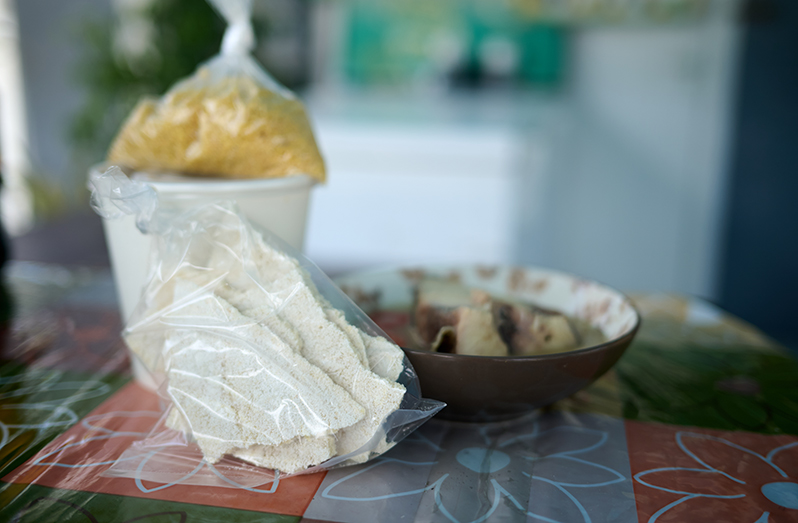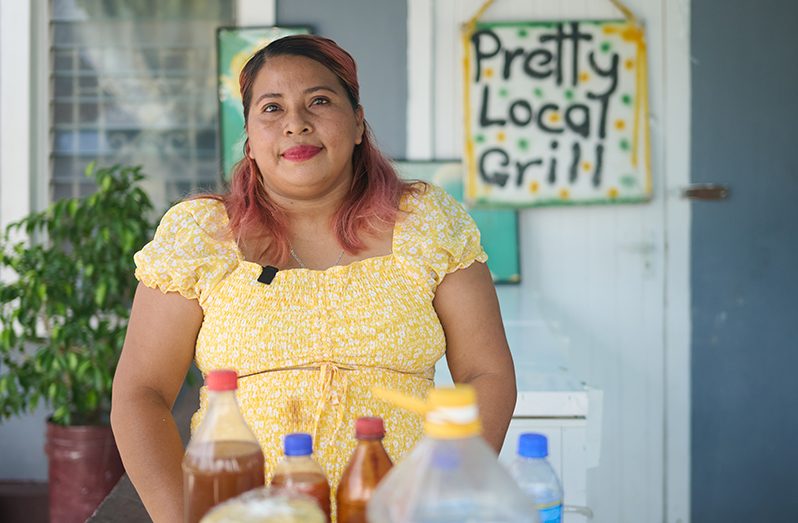EVERY September, Guyana comes alive in celebration of Amerindian Heritage Month. As a multicultural melting pot, the nation embraces this vital part of Guyanese culture with passion and authenticity—until September returns the following year.
Anselia Ranny, owner of ‘Pretty Local’, is taking it a step further by celebrating what is otherwise a seasonal occasion year-round. In the last five years, her business has emerged as one of the few places where people can experience Amerindian culture any day of the year.
Anselia’s heritage is integral to her identity. Born and raised in the village of Kamarang in Region Seven of Guyana, she grew up alongside the Cuyuni and Mazaruni Rivers. Reflecting on her upbringing, she states, “I’m from the Akawaio tribe. We basically grew up on hunting, fishing, farming.”
When Anselia found herself far from home, she sought out the traditional food she knew and loved. Initially, her cooking was a way to feel closer to home, and teach her children about their culture. She began seeking out hard-to-find ingredients, with rare fish and staples such as farine being challenging to obtain. As word spread about the woman cooking Indigenous dishes in Vryheid’s Lust, her customer base grew. With the support of family and friends, many of whom fell in love with the tastes of Region Seven, she opened ‘Pretty Local’ five years ago.
At Pretty Local, customers can find an authentic slice of Amerindian cuisine every day. “I basically sell fresh local products, seawater fish, and Indigenous staples. I also make tuma pot or pepperpot on weekends. But I normally open business every day… Every day, we open from 6 o’clock to 8 o’clock,” Anselia explains.

The journey to establishing Pretty Local wasn’t just about business; it was about filling a void in the community. “When I came out here, there was no place selling these foods. I know about Princes Street, but then to go there is a long distance. So, I decided to make my own ‘tuma pot’,” Anselia recalls. With encouragement from her husband and family, what started as a small venture quickly gained popularity. “We started off very small. And then we ended up getting a lot of people complimenting my ‘tuma pot’.”
The authenticity of Pretty Local’s offerings has attracted customers from across Guyana. “We have a lot of people from different regions. Actually, almost all the regions just come here to support,” Anselia says proudly. Word-of-mouth has been her best advertisement, with satisfied customers bringing friends to experience the unique flavours. “Even people from out here, a friend would bring them and say, come and try this. And when they come, they taste it good. You would see them. The other week, they would come back.”
Keeping it simple and traditional
Anselia’s commitment to traditional cooking methods sets her apart in a world of shortcuts and substitutions. One of her specialities is tuma pot, an Indigenous dish made with fish boiled in cassava broth. When describing her preparation, she emphasises simplicity. “When making my tuma pot, I make it naturally. I do not add any other stuff. I just use this: The cassava water, the pepper, and the fish. That’s all. And salt.” This dedication to authenticity isn’t just about taste; it’s about respecting traditional practices.
Anselia refuses to compromise when sourcing her products. She’s particularly discerning about the famed traditional drink, ‘piwari’. In recent years, there has been a decline in the authentic version. “Now, you have to wait months to get your piwari if you want the local piwari. They’re selling a lot of piwari, but they are very different from the one we make; not the traditional one,” she explains.
Pretty Local isn’t just selling meals; it’s providing an education in Amerindian cuisine and culture. Anselia’s knowledge of traditional fish varieties adds value to every customer interaction. She shares information about Haimara, a fish well-known in Region Seven, and Tambaque, praised for its health benefits. “This fish is a very healthy fish. It has plenty of Omega-3. The fat inside is not bad fat; the fat is very healthy,” she explains.
Guyana will undoubtedly continue to celebrate its diversity, with each cultural holiday seeing the involvement of all walks of life, reaching a place where celebrating culture means celebrating what it means to be Guyanese.
Places like Pretty Local play a vital role in this collective effort to preserve the many peoples of the nation. Through people like Anselia, the flavours and traditions of Amerindian culture remain accessible and celebrated beyond the confines of a Heritage Month. In doing so, she ensures that this essential part of Guyanese identity remains vibrant and relevant for generations to come.




.jpg)









